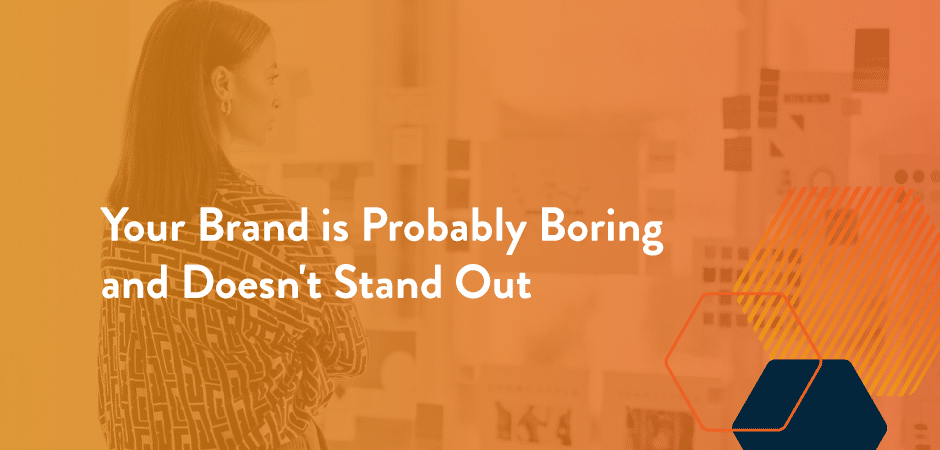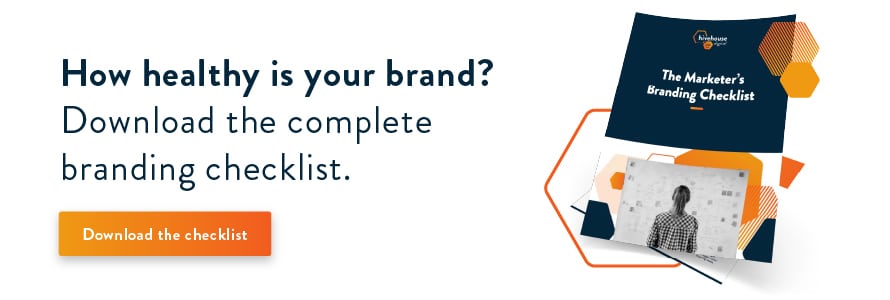
Good branding is almost magical. It compels you to work with a company, creates loyalty, and the next thing you know, you’re saying, “I’ve been going to this place for the past 20 years.”
Bad branding, on the other hand, is a slow creep. If you’re in charge of your company’s marketing, bad branding will sneak up on you like a thriller movie until one day, it’s killing your business and screaming, “Here’s Johnny!” with an axe through the door.
You don’t want that. Your brand can be one of the most valuable assets your company has, but it takes a lot of time, effort, and investment to grow a brand from nothing to something.
Today, we’re going to dive into tips to energize your brand, but first, let’s talk a little bit more about why your brand is so important in the first place.
The Importance of Branding
At its core, a brand creates trust. It lets customers know that this is a company they recognize and feel good about doing business with.
Let’s flashback back to the origin of the word brand. It started as a word that meant “piece of burning wood” in Old English and “a burning” in Old Norse — according to the trusty Online Etymology Dictionary. In more recent times, we think of a hot iron brand being applied to livestock (poor cows). This is where the idea of trust comes in. If the livestock was being purchased, a customer would be able to do so with confidence, as the brand would quickly communicate the livestock’s origin.
Today, branding is a similar concept on a larger and more complex scale. Instead of the simple marketplaces of the Roman Empire and burning adorable cows — we have ubiquitous marketing and advertising. It’s in your homes, pockets, and ears — just about everywhere is somewhere for a brand to be built and trust to be created between consumer and company.
How to Energize Your Brand
The definition of branding has evolved from marking cattle to corporations dropping sassy replies on Twitter (or X, speaking of branding that belongs on a cow’s backside). This means more opportunities to create and lose trust, so where to begin?
Be You-nique
To take your brand from ordinary to unforgettable, you need to find what makes your company unique and double, triple, or quadruple down. If you market to everybody, you’re marketing to nobody.
It starts with identifying what your company really values. When you believe in what you’re selling, it makes it much easier to sell.
A good example is REI — Recreation Equipment, Inc., a retailer that sells camping equipment and other outdoorsy gear – kayaks and whatnot. The very idea of camping is built on the idea of living with less, but here is a company I will gladly fork over my dollars to buy camping gadgets and doo-dads I do not need.
What separates REI from other outdoor stores is its emphasis on community. Not only is it a co-op, but it was founded by a group of friends. Per the REI website: “REI was founded in 1938 when a group of 23 climbing friends, united by their love for the outdoors, decided to source quality and affordable gear for their adventures.”
REI has stayed committed to its origins by offering a host of perks that aren’t just ways to sell goods but celebrate the outdoors and bring people together.
REI memberships provide dividends at the end of the year, allow members to sell their used equipment at REI, and attend REI classes on things like wilderness navigation and first aid. As a former retail employee, one of my favorites is that they close on Black Friday, putting their employees’ well-being above chasing profits.
These benefits aren’t typical retail fare. They offer real value to customers, which in turn builds the REI community, fostering loyalty as well as making customers more likely to stay committed to outdoor hobbies. By committing to what they believe in and offering their customers ways to deepen their appreciation for everything outdoors – their ideals build customer loyalty organically.
Understand Your Audience
When you find a product, service, or company you really love, it’s almost like meeting a friend. It feels like they get you and understand what you need and like.
To reach this moment as a company, you’ve got to understand your audience and build connections. Research and understand where your audience hangs out, and find the people who will appreciate what you’re building.
Also, find out who your competition is. Who is your audience comparing you to? Line them up in a row and make sure you stand out. If we go back to the friend analogy, imagine your company is a person at a party with your customers and your competitors. Your brand is the personality they display at the party. Will your customers gravitate toward your company? Does it stand out amongst the competition? Or does it blend in and leave the party early?
Once you’ve found your audience, listen to them. They’ll help keep you relevant and communicate how their needs shift over time.
Be Consistent
Branding should be consistent. A Google Ad and the packaging your product comes in should both feel like your company. Style guides, including voice and tone, go a long way toward standardizing what your brand looks and sounds like.
With all of the different channels and platforms, it can be challenging to stay consistent, but here’s another human-based analogy for you: We all act a little differently in certain social settings. You’re going to show a different side of your personality in church with your Mom than you would at a party with your friends from college. At the end of the day, you’re the same person. Marketing channels work similarly. You may use a slightly different tone on Twitter/X than you would on LinkedIn because the audiences expect different approaches, but your company should communicate the same values.
Need Better Branding? Hivehouse Can Help
Branding is one of the most valuable assets a company can have. Phil Knight, the founder of Nike — one of the most valuable brands in the world, in an interview with Harvard Business Review, admitted that Nike was more of a marketing company today than a product or tech company. “Now we understand that the most important thing we do is market the product. We’ve come around to saying that Nike is a marketing-oriented company, and the product is our most important marketing tool. What I mean is that marketing knits the whole organization together.”
At Hivehouse Digital, we’ve been building brands in digital marketing for B2B businesses in construction, manufacturing, and professional services for over ten years. Ready to learn more about how we can help you with just about anything we mentioned above? Get started with our Marketer’s Branding Checklist – a starting point to check off all the assets you need to start marketing your company with a high-level brand.
Get the latest news
Blog Topics
- Analytics
- Branding & Identity
- Budget
- Construction
- Content Marketing
- Conversion Rate Optimization
- Email Marketing
- HubSpot
- Inbound Marketing
- Lead Generation
- Marketing Strategy
- News/Events
- Paid Search & PPC
- Recruiting
- Sales & Marketing
- Sales Enablement
- Search Engine Marketing
- Search Engine Optimization
- Social Media
- Thought Leadership
- Uncategorized
- Usability
- Video Marketing
- Web Hosting
- Website Design
